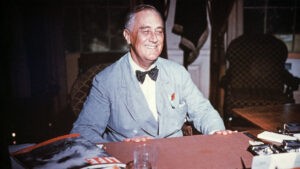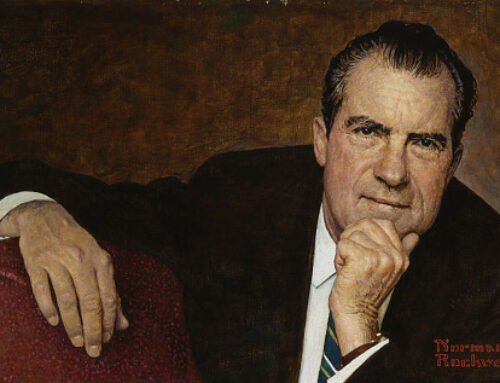Franklin D. Roosevelt, also known by his initials FDR, was the 32nd President of the United States. He served in office from 1933 to 1945, leading the United States through some of its darkest hours, including the Great Depression and World War II.
Roosevelt was born on January 30, 1882, in Hyde Park, New York. He came from a wealthy and influential family, and he attended prestigious schools, including Groton School and Harvard University. After graduating from Harvard, Roosevelt attended Columbia Law School, but he never practiced law. Instead, he entered politics, serving in the New York State Senate from 1911 to 1913.
In 1913, Roosevelt was appointed as the Assistant Secretary of the Navy, and he served in that position until 1920. In 1921, Roosevelt was struck by polio, which left him paralyzed from the waist down. Despite this setback, he continued to pursue a career in politics, and in 1928, he was elected as the Governor of New York.
As Governor, Roosevelt implemented several progressive policies, including legislation that provided relief to the unemployed and the poor. In 1932, he was nominated as the Democratic Party’s candidate for President, and he easily defeated his Republican opponent, Herbert Hoover.
As President, Roosevelt faced the enormous challenge of dealing with the Great Depression, which had plunged the United States into economic despair. He responded by implementing a series of sweeping reforms, known as the New Deal, which aimed to provide relief, recovery, and reform to the American people. The New Deal included programs like the Civilian Conservation Corps, which provided jobs for young men, and the Social Security Act, which provided financial support to the elderly, the disabled, and the unemployed.
In addition to dealing with the domestic challenges of the Great Depression, Roosevelt also had to confront the growing threat of global aggression. In 1939, World War II broke out in Europe, and in 1941, the United States was drawn into the conflict after the Japanese attacked Pearl Harbor. Roosevelt led the United States through the war, working closely with other world leaders, including British Prime Minister Winston Churchill, to defeat the Axis powers.
After serving four terms in office, Roosevelt died on April 12, 1945, just a few months before the end of World War II. He is widely regarded as one of the greatest Presidents in American history, and he is remembered for his leadership and his commitment to the American people.
So the question is what are the things which you can learn from a Relative of Teddy Roosevelt who was in office for longer? The man who served more than 2 terms when you can’t find 3 term president ? who was the leader of the United States for more than 10 years during the second world war and who successfully tackle the great depression. who was a polio patient and so there is no photo of him standing?
The answer is many things. As he was the longest-serving president, I will also write in length. Theodore Roosevelt is the fourth wealthiest President in history, behind Trump, Washington, and Jefferson. Franklin D. Roosevelt placed just behind Clinton in 10th place. Theodore is the uncle of Franklin’s wife Eleanor Roosevelt (his fifth cousin once removed), so you know the connection. Each hails from a different branch of the family, with the Oyster Bay Roosevelt’s siding with Republicans as the Hyde Park Roosevelts associated with Democrats. There may be no reason to write about it but some of my readers may not realize that there is a relation so I disclose it.
But long before they were the most powerful and prominent family in American politics, the Roosevelts owned a 50-acre farm in what’s now known as Midtown Manhattan. It included everything between Lexington and Fifth Avenues between 29th and 35th street, including the Empire State Building. As this is one family of one wealthy family which gave 2 presidents, This post will include many past family members from whom Teddy Roosevelt and FDR received wealth.
Claes Martenszen van Rosenvelt emigrated to New York from Amsterdam in the 1640s when it was called New Amsterdam. The family owned a farm in prime real estate during the time and made money buying and selling dry goods, sugar imports, and real estate.
His son Nicholas Roosevelt was the first in the family to hold elected office, as an alderman of the American colonies. He was also a fur trader and freeman who remained friendly with the land’s native tribes while ruling over the family’s slaves with ruthless aggression. Nicholas is the last common ancestor of the Oyster Bay Roosevelts and Hyde Park Roosevelts, which were founded by his sons Johannes and Jacobus.
Although divided between the two regions of New York (and in political ideation), each Roosevelt faction continued to add to the family fortune. This makes them a model of how to create generational wealth, versus Vanderbilt’s story of how to squander it.
FDR’s father was a coal and transportation magnate who grew the family fortune and left it to his wife Sara upon death. She held the money over for her son Franklin and his wife, whose total personal estate totaled only $12,000 until Sara died in 1941. Theodore Roosevelt inherited the remnants of the Oyster Bay Roosevelt fortune from his father and was uninterested in business. His peak net worth is estimated at $141.4 million, and he lost much of his money in bad investments.
Here comes the lesson. The reason I was typing and searching all this. Even big and wealthy people lost their fortune in investments. The market will reward you for your risk-taking ability but if you didn’t know how to manage it and how to mitigate risks, how minimize them, you will be lost it. Losing fortune if not managed correctly is a characteristic of Financial planning. It is important. and so does the Investment policy statement.
Your forefathers made wealth for a long time. It took time for them but one wrong deal. One wrong investment Can easily destroy. Ulysses S Grant Lost a fortune for debt which he made in his lifetime. In this case, it is different as FDR made wealth through knowledge. The presidential library set the rule for good.
FDR will be known as one great President who leads a nation that needs the One leader the most.




